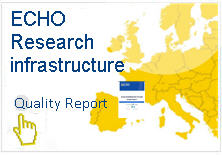Page 1
INTRODUCTION
1. Background and research objective
The healthcare policy agenda in Europe is driven by the goal of making better healthcare accessible to all while providing sustainable systems and services for increasingly aged populations.
To inform decision-makers involved in this critical endeavour, ECHO has created a knowledge infrastructure built upon the integration of various countrywide information infrastructures, allowing for sound international comparison.
Conceived as a demonstration project, ECHO was modelled upon the pioneering Dartmouth Atlas project in the US(www.dartmouthatlas.org)and the VPM Atlas in Spain(www.atlasvpm.org).
The goal of ECHO is to describe and analyse unwarranted in- and between-country unwarranted differences in several performance dimensions, including equity of access to effective care, quality, and efficiency (in terms of value-for-money and provider-level efficiency).
2. ECHO added value
ECHO has expanded the usual approach to international healthcare performance comparisons by aggregating patient-level data. ECHO thus shifts the focus to the comparison of performance variation within and across countries over time, using ad-hoc benchmarks.
To this end, ECHO has carried out several critical tasks:
1) Building a homogeneous knowledge infrastructure, including hospital discharges, ECHO performance indicators and contextual demographic, socioeconomic and supply information.
2) Allocating each of these hospital admissions to a geographic area (healthcare area, province, region and country).
3) Developing crosswalks across different languages and coding systems to create comparable performance indicators.
4) Pooling all eligible cases along with key variables (age, sex, comorbidities, concomitant interventions, etc.) for around 68 performance indicators.
5) Building national and international performance benchmarks.
6) Adapting statistical methods (disease mapping, Bayesian techniques and multivariable hierarchical modelling) to the issues of interest.
3. The ECHO Handbook on Methods
The ECHO Methods Handbook critically describes the inherent methodological issues through either brief reviews or case studies.
Conceived as an on-line publication, the handbook will first describe the methods used in the construction of the ECHO Atlas Reports. However, the handbook will be progressively elaborated with new entries detailing the methods used to answer research questions stemming from the interaction between the ECHO consortium and the ECHO research infrastructure.
Please cite this publication as:
European Collaboration for Healthcare Optimization (ECHO) www.echo-health.eu. Zaragoza (Spain): Instituto Aragonés de Ciencias de la Salud- Instituto Investigación Sanitaria Aragón; c2011. ECHO consortium. Handbook on methodology; 2014 Apr 27 [ accessed: date ]; Available from: http://www.echo-health.eu/ handbook/introduction.html





